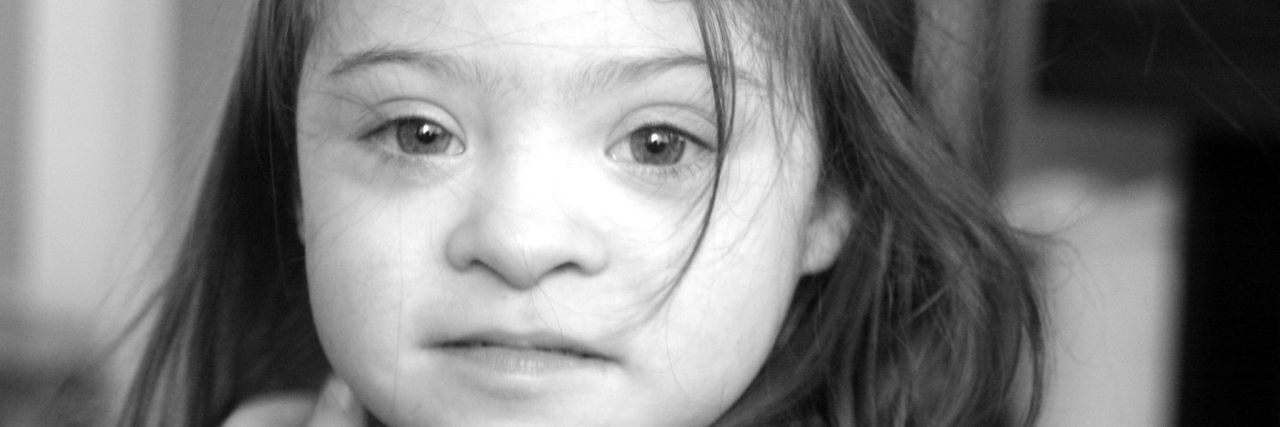What That CBS Report on Iceland's Abortion Rate Failed to Say About Down Syndrome
Sometimes the news isn’t as straightforward as it’s made to seem. Ellen Stumbo, The Mighty’s Parenting Editor, explains what to keep in mind if you see this topic or similar stories in your newsfeed. This is The Mighty Takeaway.
A recent CBS news report on Iceland’s abortion rates and almost extinct Down syndrome population has the Down syndrome community talking.
As the mother of a child with Down syndrome, this makes me realize how little our world in general values people with disabilities. I should not have to reason with someone why my daughter deserves to be alive, but one of the most common questions I get asked is, “Did you know before she was born?” To me, this question implies children with Down syndrome are not wanted. My daughter is wanted, and she was wanted when a level II ultrasound revealed several markers consistent with Down syndrome.
But let me be honest — at the time, her diagnosis felt devastating. It felt devastating because my disability attitudes were found in ignorance and pity. I only knew stereotypes about Down syndrome. I thought of disability as something tragic. I did not have any friends with disabilities. I did not spend time around people with disabilities. I did not know. And media did not help, as the portrayal of people with disabilities is lacking accurate representations.
When my daughter was born, she challenged what I viewed as perfect, worthy, important, and valuable in life. I had made wrongful assumptions about what her life would be like because of my negative disability attitudes, only to quickly recognize her life had the same value as someone without a disability, and her life was just as beautiful and full. The treasures I have discovered along the way because of my daughter’s diagnosis remind me our greatest contributions are not found in our strength, performance, eloquence or confidence.
I won’t say Down syndrome is “easy” because parenting a child with a disability does bring extra challenges. But challenges are not what define the value of life.
Because what exactly determines the value of a life? The value of a child… any child?
Should the value of a child’s life be reduced to their academic performance? Then why is the life of a child with Down syndrome held to this standard?
Should the value of a child’s life be reduced to their medical conditions? Then why is the life of a child with Down syndrome held to this standard?
Should the value of a person’s life be reduced to the job they will have? Then why is the value of a person with Down syndrome held to this standard?
Down syndrome is not just a condition or a statistic, Down syndrome is a person, it is people like my child.
Expectant parents do not really know what Down syndrome is and are left with only the medical opinion of the condition.
When you are pregnant and your baby has a possibility of having Down syndrome, doctors respond. Their response, sadly, is often not a welcoming one. Most do not offer up-to-date information or to connect you with other parents who have children with Down syndrome. Most doctors do not talk about Down syndrome beyond their medical experience. They talk about how Down syndrome will affect your baby — a “doomed” medical condition in which your child will “suffer” greatly — because so many things could go wrong. They give inaccurate information based on the worst possible scenarios — like our pediatrician, whose disability attitude was “pity” as he confirmed the diagnosis at birth: “I am very sorry to tell you this, but your child does have Down syndrome.”
Maybe it’s time we move from being “sorry” to offering support.
It’s definitely time for accurate information and connecting parents with Down syndrome organizations or other parent mentors.
When I hear an expectant mom is going to have a child with Down syndrome I say, “Congratulations, I know it might be hard to believe it now, but you might come to love Down syndrome as part of who your child is. You will experience shades of color you never knew were possible. Ask me questions, as many as you have, I am here for you. You are not alone.”
The Down syndrome community is strong and supportive. We gather around new parents and we cheer them on. We know what it was like to be a scared parent not knowing what to expect, having to face stereotypes and negative disability attitudes. We’ve been there, and if you are an expectant parent, we got you.
Parenting a child with Down syndrome might not always be easy, but it is good!

